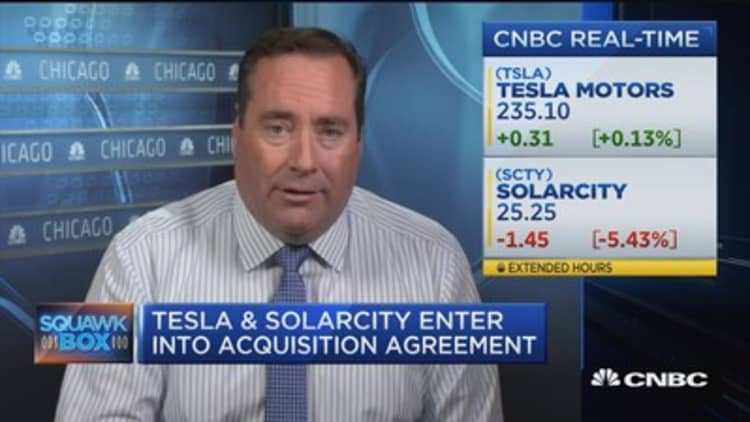
Another week, another big tech deal that shut out Wall Street's top banks.
Tesla's much-anticipated announcement Monday that it would acquire SolarCity caught few off guard — Elon Musk is CEO of both companies and has worked hard to convince investors that the merger of a electric car maker and a solar panel company is a good idea.
But perhaps more importantly for Wall Street, big banks again got shut out of a major tech deal, and that may be a source of increasing concern among big banks that are facing serious margin pressure this year.
When the $2.6 billion deal was announced Monday, Evercore was revealed as Tesla's adviser, and Lazard turned up on SolarCity's end of the deal.
Evercore and Lazard will split about $45 million in advisory fees, says Jeffrey Nassof, director at mergers and acquisitions consulting firm Freeman & Co. This year, smaller banks like Evercore have dialed up the portion of M&A deals they're winning.
The big banks increasingly share large M&A deals with smaller firms or are shut out of them altogether.
Verizon has increasingly leaned on boutique PJT Partners, and it hasn't even been a year since the boutique was spun off from Blackstone in an IPO of its own.
For the second time in two weeks, Paul J. Taubman's boutique wound up advising Verizon on a big deal. Last week, it was the $4.8 billion acquisition, and on Monday morning PJT once again was revealed to have advised Verizon on another deal, its $2.4 billion Fleetmatics buy. Morgan Stanley took the role of adviser to Fleetmatics in the deal.
Silicon Valley's top tech companies have gravitated toward smaller banks for advice on M&A, although they still need institutional Wall Street players to raise debt or to launch an equity offering. But for the big Wall Street banks that helped coordinate and lead IPOs for both Musk companies, it must have stung.
Boutiques that elbowed big banks aside to take a piece of the $26 billion sale of LinkedIn to Microsoft, as well as the $32 billion Softbank-ARM Holdings deal, took hundreds of millions from Wall Street firms.


